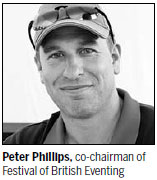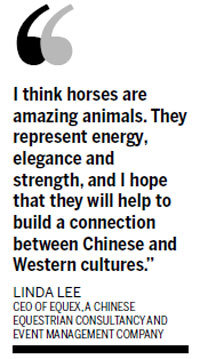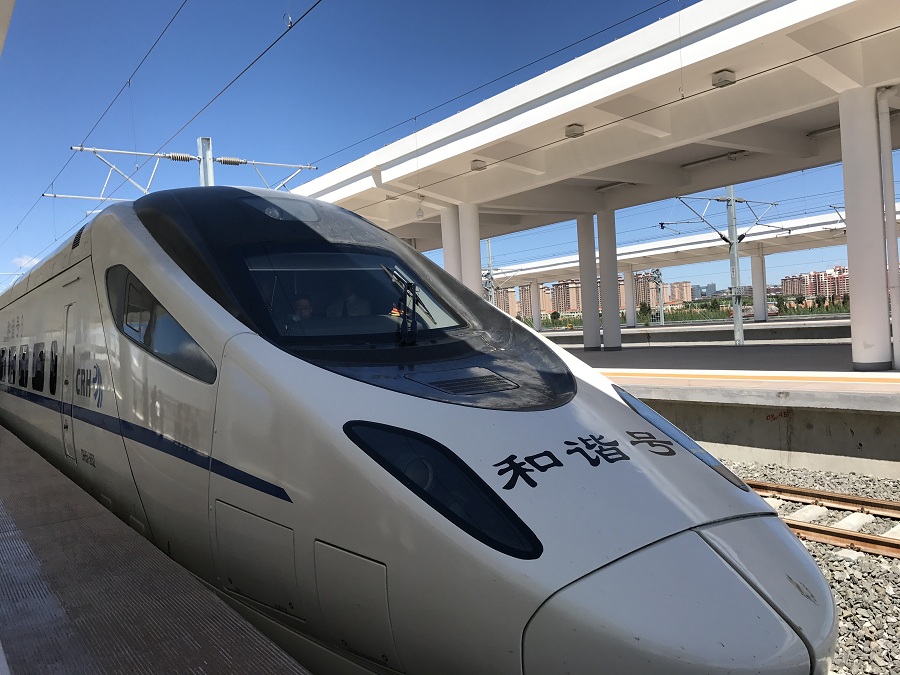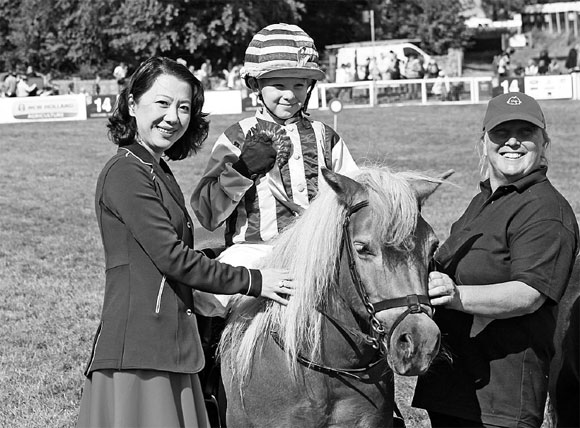Riding at full gallop in the land of tallyho
By Cecily Liu (China Daily)
Updated: 2014-09-15
Firm from China leaves hoof marks on major British equestrian event
The earliest origins of modern equestrian sports can be found, in large part, in the bygone age of British chivalry and knighthood. Horses have a different although equally significant history in Chinese culture, says Linda Lee, CEO of Equex, a Chinese equestrian consultancy and event management company.
It is Lee's love of horses and her passion for culture that prompted her to promote Chinese horse culture at UK equestrian events.
In August, Equex participated in the Festival of British Eventing at Gatcombe Park for a second year, as a key sponsor of the equestrian advanced class. Eventing is an equestrian triathlon consisting of dressage, cross-country, and show jumping.
As one of Britain's most significant equestrian events, the festival took place at the private grounds of the home of Princess Royal Anne and incorporated the British Open, intermediate and novice championships.
Sponsorship of the festival provided valuable exposure for Equex, and Lee presented prizes to the winners of the advanced class alongside Princess Anne.
Equex's characteristic logo could be seen flying from flags around the main stadium and adorning the famous water complex on the cross-country course.
The company also erected an Inner Mongolian yurt, a traditional shelter somewhat like a tent but with stronger walls, close to the main arena. It gave visitors the opportunity to learn a little about Chinese equestrian culture and the important role that horses have played in Inner Mongolia autonomous region.
Inner Mongolia has a reputation for being the land of the horse, as legendary 13th-century warrior Genghis Khan used horses effectively in establishing an empire that extended from Hungary to Korea and from Siberia to Tibet.
In today's Inner Mongolia, although horses are no longer used for battle, they are still commonplace and most children are taught to ride from a young age. More importantly, horses still represent the spirit of warriors in Chinese culture.

To depict these stories, Equex's yurt used vivid pictures of wild horses running across extensive grasslands, painted by the Inner Mongolian artist Zhao Ruyi, a picture of Genghis Khan and some Inner Mongolian costumes and riding gear.
Other authentic objects included beautiful tables, chests and a water jug. The yurt, a highlight of the exhibition area, also offered visitors the opportunity to sample Inner Mongolian food.
Antje Pennycott, a horse owner from Stroud, a market town in South England, says she was fascinated to learn about Inner Mongolian horse culture through the Equex yurt.
"I love horses, and it is interesting to see what horses represent in different cultures. I have certainly learned something new today," said Pennycott.
Anne-Marie King, a horse-farm owner from Cambridge in the North Island of New Zealand, says she was amazed by the yurt and was delighted by the paintings and the Inner Mongolian food.
King says the diversity introduced by the Equex yurt was a wonderful addition to the festival.
"I have an open-minded attitude about new players in the equestrian industry, and I am very interested in China's growing horse sport market, therefore visiting the yurt has been fantastic," King says.
Peter Phillips, son of Princess Anne, was co-chairman of the festival with his father, Mark Phillips, an Olympic gold-medal-winning horseman and ex-husband of Anne. Phillips also expressed great appreciation for Equex's efforts to promote cultural exchanges between China and the United Kingdom through equestrian sports.
"I think what Equex has done will help people in the equestrian industry to understand that horses in China's history go back much further than the Anglo Saxon culture," says Phillips.
"It is important to emphasize this part of Chinese culture to the outside world. So if the general public understands about this, they will want to take an interest in equestrian events in China," says Phillips.
Phillips says it is important to have Equex as a partner for the Festival of British Eventing, "as it gives us an additional seal of approval that we are one of the top events in the country".
He met Lee two years ago when Equex first established itself in the UK market and started to look for partners to work with. Lee then invited Phillips to the first Shanghai International Horse Festival in December 2013, which Phillips says he enjoyed.
The Shanghai festival, organized by Equex, is a week of equestrian performance, competitions, symposiums, banquets and a charity auction. It attracted about 50,000 visitors last year, and at its peak about 6,000 to 7,000 a day. The festival was deemed such a success that Equex decided to host it again this year, as the renamed Horse on the Bund on Oct 24-26.
"I watched the opening ceremony and events on the first day, which I thought were really good. We saw a good mix on display," Phillips says.
He says Equex's participation in the Festival of British Eventing should help to attract more top riders and international audiences to Horse on the Bund.
"I think the more Equex does here in the UK, the more they will increase awareness among the audiences they hope to invite to Shanghai. As Equex becomes known in the UK marketplace, it adds to its level of authenticity, in the eyes of the international audience," Phillips says.
As one country of origin for horseracing and equestrian events, horses have a special place in British culture, Phillips says.
"Horses have been intrinsically linked to British history, from the beginning of times, so if you were to take a snapshot of British history, there would be horses involved in military, agriculture and recreational activities," he says.
In the 21st century, Phillips says, the importance of the horse in British culture remains.
Founded in Shanghai in 2010, Equex has rapidly expanded globally, with offices in London, New York and Dubai. Although Equex is a young company, it has about 30 employees, most of whom are based in China, and a team of experienced professionals leading the operations.
Equex's UK operation is headed by Simon Robinson, who previously served as crown equerry, responsible for the queen's equestrian interests at Buckingham Palace, Windsor Castle and the Royal Stud at Hampton Court.
Lee says it is her ambition to help more and more people in China develop an appreciation for equestrian events by facilitating the development of the sport in China, and to provide the Western world with an appreciation of Chinese equestrian culture.
"I think horses are amazing animals. They represent energy, elegance and strength, and I hope that they will help to build a connection between Chinese and Western cultures," says Lee.
cecily.liu@chinadaily.com.cn
|
Linda Lee, CEO of Equex, a Chinese equestrian consultancy fi rm, presents an award at the Festival of British Eventing in August.? Cecily Liu / China Daily |

(China Daily 09/15/2014 page14)

High-speed train debuts in Inner Mongolia
A bullet train departed Hohhot East Railway Station for Ulanqab marking the start of high-speed rail services using Inner Mongolia’s first newly-laid high-speed railway on Aug 3.

